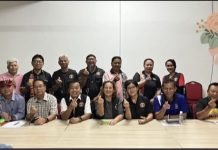KOTA KINABALU: Usukan State Assemblyman Datuk Seri Dr Salleh Said Keruak has urged the state government to strengthen human capital development through various efforts, particularly in the areas of education and health.
In making the call, he said this was in line with the government’s vision to produce competitive human capital in a changing business environment.
Apart from that, Salleh said it was vital to ensure the smooth implementation of the Sabah Maju Jaya Plan, especially in terms of the level of readiness and ability of the manpower.
The former Sabah Chief Minister, said there was a need to give priority to educating the workforce as well as future generations on new kinds of jobs that were in high demand.
These include information technology and software development, digital marketing, finance, project managers, sales and business executives, medical professionals, educators and customer service executives, he said.
“Therefore, we need to take a holistic approach and focus on the type of education that enhances the skills of our society, thus mastering the kinds of jobs as well as new technologies that are more digital and automated,” he said.
Salleh said this when debating on the motion of thanks to Sabah Yang Dipertua Negeri Tun Juhar Mahiruddin for his government policy speech at the Sabah State Assembly here today.
He said the role of the government was key to developing the skills and level of education of the community.
“Some governments are actively involved in increasing human capital by offering higher education to the people at no cost.
“These governments realise that the knowledge people acquire through education helps develop the economy and boost economic growth.
“Employees with more education or better skills tend to earn higher incomes, which in turn, boost economic growth through additional consumer spending,” he said.
Conscious of the need to prioritise health,
Salleh hoped the number of Covid-19 cases would continue to decline as the state entered the endemic phase of the Covid-19 soon.
“Apart from familiarising ourselves with the new norms, we have a golden opportunity to review the role of health in the post-pandemic future.
“If we make health a priority, this will allow us to increase resilience, reduce the health gap, and improve economic and social conditions,” he said.
To achieve that goal, Salleh suggested several approaches that need to be considered.
In this respect, he recommended that the government ensure health is part of the discussion of economic growth.
Salleh also suggested that
the government takes an integrated approach to improving aspects of health.
“The most effective health agenda is to balance environmental, social and behavioral health as well as preventive care in addition to treatment needs,” he said.
Salleh also stressed the importance of promoting innovation.
“For emerging economies, innovation in healthcare delivery will be needed to bring these interventions at low cost to people who don’t have them today.
“This means new funding and procurement models, broader partnerships and collaborations, and a broader set of shared priorities,” he said.-pr/BNN






